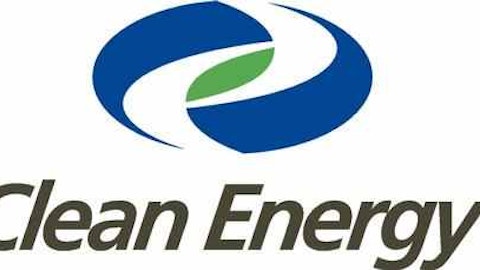When it comes to the highly charged biodiesel industry, one company stands above the rest. Way above. Renewable Energy Group Inc (NASDAQ:REGI) is not only the leader in terms of pure production capacity, but it also displays plenty of desirables that should be on every investor’s radar. What makes the company so great? It is no secret. In particular, REG has focused on three areas to become the top biodiesel stock.

A lot of investors get giddy with excitement when talking about the distribution and logistics network of Clean Energy Fuels Corp (NASDAQ:CLNE). It may produce compressed natural gas for commercial truck fleets, but it has a lot in common with REG. Don’t believe me? Take a look at Clean Energy Fuels Corp (NASDAQ:CLNE)’s distribution network:

Source: Clean Energy Fuels.
And see how it compares with that of REG:

Source: Renewable Energy Group.
The major difference is that REG has no need for dozens of filling stations, as it sells the biodiesel it produces to distributors. Nonetheless, coast-to-coast infrastructure for both companies will allow them to take advantage of short and long term market conditions, move fuels to high-demand hubs, build a loyal and dependent customer base, and weather volatility better than smaller peers.
2. Focus on smart growth
You can’t build an enviable distribution and logistics network overnight. That’s what makes smart growth such a key aspect of REG’s business. When listening to the 2012 conference call, I was thrilled when management stated that it had turned down multiple acquisition targets in 2012 because more favorable opportunities existed elsewhere. Pulling the trigger at every opportunity and taking a “growth at all costs” approach can be a dangerous game for investors. Absorbing just one “lame-duck” biorefinery — because of a retrofitting deemed too costly, an unfavorable location, or an unrealistic payback period — into its network could do much more harm than good.
Luckily, managing cash in a responsible and sustainable way has paid off tremendously. REG has brought at least eight biorefineries under its control since 2006, which represent a total annual capacity of 260 million gallons (only 215 million gallons are currently active). Three of those acquisitions have been made in just the last three quarters. A stable of next-generation biorefineries currently under construction — representing 135 million gallons of additional annual capacity — may slow the pace of future acquisitions. However, I wouldn’t bet against seeing management gobble up great growth opportunities should they arise.





